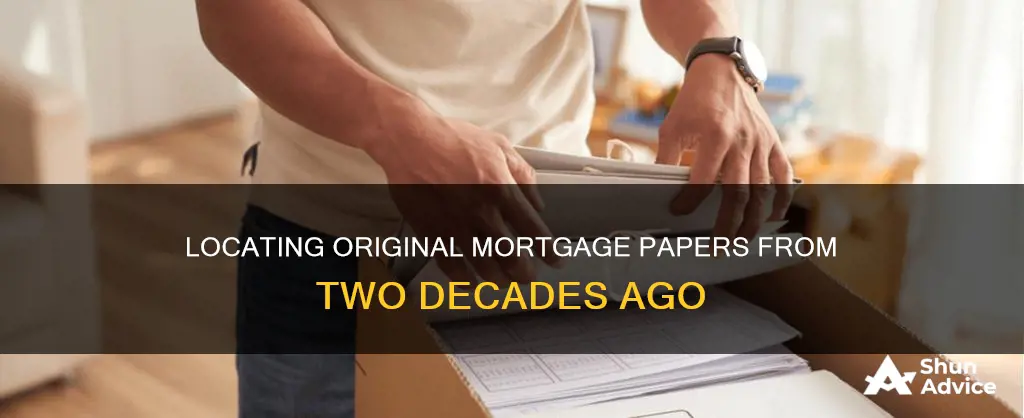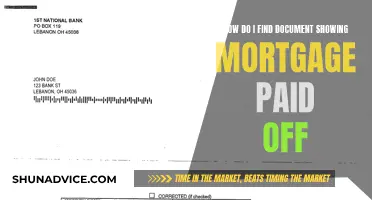
If you're looking for your original mortgage papers from 1997, there are a few places you can try. Firstly, check with the title company that insured the title when you bought the property, as they should have copies of all the closing documents. You can also try contacting your mortgage company, any attorneys involved in the transaction, or the county where your property is located. These documents are public record and are available to anyone who wants to view or obtain copies. If all else fails, you can visit your county clerk's office and perform a search in person, using the property address or your name. It's a good idea to keep your original mortgage documents safe, such as in a fireproof and waterproof safe or a safe deposit box at your local bank.
| Characteristics | Values |
|---|---|
| What to do if you lose your original mortgage papers | You can get a replacement from your mortgage lender or local recorder's office. |
| How long to keep mortgage documents | It is recommended to keep certain documents, like the mortgage note and deed, until your loan is paid off or until you sell your home. |
| Where to obtain a copy of your mortgage agreement | You can obtain a copy from the land records office in the county the property is located in. |
| How to request mortgage papers | You can make a formal written request to the mortgage company, title company, or the county where your property is located. |
What You'll Learn

Requesting copies of your mortgage agreement
A mortgage agreement is an important document that you likely don't think about often. If you purchased a home with a loan, you likely have a mortgage agreement. This document records the transfer of interest in land as security for a loan or other obligation. A mortgage agreement and a deed of trust are essentially the same documents and are used when a borrower uses the property as security to acquire a loan.
After the mortgage agreement has been signed by the parties and the notary, the document is filed at the land records office in the county the property is located in. The office may be called different things depending on where you live, for example, the County Clerk’s Office, Register of Deeds, or County Recorder’s Office.
If you need to obtain a copy of your mortgage agreement, you will need to do so at the office where the mortgage is filed. This can be a tricky process, and you may need to enlist the help of a professional document retrieval service. It is a good idea to obtain a copy of your mortgage agreement, as it is important to have in certain circumstances, even if these are rare.
If your original mortgage documents have been lost or damaged, you can usually get a replacement. Many companies that participate in real estate transactions, like lenders and title companies, keep this type of paperwork on file. If you need a physical copy of a particular document, the company involved in that part of the deal or your local recorder’s office may be able to send you a replacement.
Finding Homeowner Mortgage Details: A Property Guide
You may want to see also

Contacting the mortgage company
If you are trying to find your original mortgage papers from 1997, there are a few steps you can take to obtain them. Here is some detailed information on contacting the mortgage company:
Firstly, identify the mortgage servicing company or lender. If you are unsure, a real estate attorney can help you with this. If the mortgage company has merged with another entity or been acquired, you will need to contact the new owner of the mortgage.
Next, reach out to the mortgage company's customer service department. You can usually do this by phone, email, or online chat. Explain that you need to obtain copies of your original mortgage documents from 1997. They may direct you to fill out a request form or provide instructions on how to submit your request in writing. Ask about any fees that may be associated with retrieving these documents.
Provide as much information as possible to help them locate your records, including your name, property address, loan number (if you have it), and the approximate dates of the mortgage. If you have any other identifying information, such as an account number or previous statements, this may also be useful.
If you are an heir seeking mortgage documents, you may need to provide additional documentation to prove your entitlement to the information. This could include a death certificate, will, or other legal documents.
If you are unable to obtain the documents directly from the mortgage company, they may direct you to the local recorder's office or the land records office in the county where the property is located. These offices maintain records of property transactions, and you can request copies of your mortgage documents from them. There may be a fee associated with this service.
Remember to keep your own records safe and secure. It is recommended to keep important mortgage documents, such as the mortgage note and deed, until your loan is paid off or even until you sell the property. You can store them in a fireproof and waterproof safe or a safe deposit box at your bank.
Finding Your Hamp Mortgage Servicer: Who and How?
You may want to see also

Getting documents from the county
If you've lost or damaged your original mortgage documents, don't panic! You can usually obtain replacement copies from your mortgage lender or the local recorder's office. These documents are typically filed at the land records office in the county where the property is located. This office may be called the County Clerk's Office, Register of Deeds, or County Recorder's Office, and you will need to obtain your mortgage agreement from the office where it was initially filed.
Some counties make their district court records searchable through the district clerk's website, and some counties make their court records searchable on the county clerk's website. Larger counties with online databases include Bexar, Collin, Dallas, Denton, Harris, Tarrant, and Travis counties. If the records you are looking for are not available online, you will need to contact the district or county clerk's office directly.
To obtain your documents, you may need to bring your original documents, along with the appropriate fees, and a self-addressed stamped envelope. Some offices may also allow you to mail these items to them, and they will send you a copy of your requested document. Additionally, some offices offer an eRecording option, where you can retain your original document and receive the recorded image the next day.
It is important to note that the specific process and requirements for obtaining your original mortgage papers may vary depending on your location and the specific county office's procedures. It is always a good idea to contact the office beforehand to understand their specific requirements and processes.
Accessing Your Mortgage Statement: A Quick Guide
You may want to see also

Keeping mortgage documents safe
Store in a Safe Place
Keep your original mortgage documents in a fireproof and waterproof safe in your home. This ensures their protection from potential fire or flood damage. At the very least, store paper copies in a locked filing cabinet.
Safe Deposit Box
If you prefer not to keep your documents at home, consider using a safe deposit box at your local bank. This option provides an additional layer of security, as the documents are stored off-site in a secure location.
Digital Storage
It is advisable to have digital copies of your mortgage documents. Store them in cloud-based storage or on an external hard drive. This offers the advantage of remote access and an extra layer of protection in case the physical copies are lost or damaged.
Obtain Copies
If you have lost or damaged your original mortgage documents, don't panic. You can usually obtain replacement copies from your mortgage lender, local recorder's office, or the companies involved in the real estate transaction, such as lenders or title companies. These institutions typically keep records of such transactions.
Retention Period
The recommended retention period for mortgage documents varies. Some sources suggest keeping certain paperwork, such as the mortgage note and deed, until the loan is paid off or until you sell the property. Others recommend retaining documents for at least seven years after selling your home. This includes proof of mortgage payoff, the closing statement, and receipts for capital improvements. If you decide to refinance, a three-year retention period is suggested, although keeping the documents for up to ten years can be beneficial in case of statement errors or unexpected changes in interest rates or payments.
Finding Your Wells Fargo Mortgage Balance: A Guide
You may want to see also

The importance of keeping mortgage statements
While it is not necessary to keep every single mortgage statement, it is important to keep certain documents for at least as long as you have a mortgage on the property. These documents can be vital for proving ownership, resolving disputes, and making financial decisions.
Firstly, it is important to keep mortgage statements and documents that prove ownership of the property. This includes the deed, which should be kept for as long as you own the property, and even after, if there are any ongoing or expected disputes. The deed is an important document that records the transfer of interest in the land as security for the loan. It is also recommended to keep the mortgage note, which is an agreement with the mortgage lender that they will hold the property's title until the full loan amount is repaid.
Secondly, keeping mortgage statements and documents can help resolve disputes and provide valuable information in the event of a future home sale. For example, if there is a challenge to the title, having the mortgage paperwork can prove ownership of the property. Additionally, keeping records of repairs, additions, or renovations to the home can help with calculating capital gains tax and during audits.
Thirdly, mortgage statements contain important financial details that can inform decision-making. These statements include upcoming payment information, such as the amount of the next mortgage payment and a breakdown of principal and interest. They also provide loan and account details, including the account number, property address, loan balance, and interest rate. This information can be useful when considering refinancing options, as knowing the current interest rate allows for comparisons with market rates.
Finally, it is important to keep certain mortgage documents for a minimum period after selling a property. For example, tax records should be kept for at least three years after selling, while other home sale records, such as proof of mortgage payoff and the closing statement, should be kept for at least seven years. Keeping these documents can help with future financial and legal matters, providing valuable information and potentially saving time and money.
Finding Proof of Paid-Off Mortgages
You may want to see also
Frequently asked questions
There are several ways to find your original mortgage papers from 1997. Firstly, check with the title company that insured the title when you bought the property, as they should have copies of all the closing documents. If that doesn't work, contact your realtor, who should be able to point you in the right direction. You can also try contacting your county land records office, which could be the register or recorder of deeds, to obtain copies of the deed and mortgages. These documents are public record and are available to anyone who wants to view or obtain copies. If your records are not available online, you can go to the recorder's office in person.
When making a request, be as specific as possible and include as much information as you can. Provide your name, the property address, and the loan or account number. Also, detail which documents you are requesting. Make sure you use the name that appears on the mortgage documents, and if you have changed your name since then, include both names.
The mortgage company is required to respond to any conforming written request for information without charging for their time or the paper. However, the title company may or may not charge a copying fee. You may have to pay for copies from the county, but the mortgage lender must provide you with copies free of charge as long as you make a formal written request sent to the proper address.
It is recommended to keep your mortgage papers for at least seven years after selling your home. This includes proof of mortgage payoff, the closing statement, and receipts for capital improvements. Keep the promissory note, closing disclosure, deed of trust, and proof of title insurance for the life of the loan. You should also keep tax records for at least three years after selling the property, as the IRS may ask for written proof of any deductions, income, or credits during this time.







